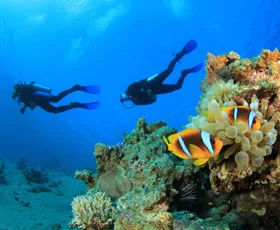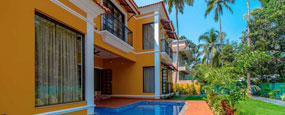Q. Snorkeling seems easy,do I really need training?
A. Yes, training ( even if its brief) and instructions are important when you wish to do snorkelling or going for regular swimming, its in the best interest of your life and can avoid any risks that may be involved. Our team wants your to experience the best when it comes to scuba diving or snorkeling in Goa.
Q. I've always wanted to learn to scuba dive (or snorkel). How do I get started?
A. If you are in Goa, you can contact us or write to us and we will help you book the scuba diving trip / snorkelling trip with professionals. You should always choose a safe way when you want to adventures along the sea waters.
Q. Is learning to dive difficult?
A. No, its not difficult, but yes, if you do not follow the right instructions and training, you may be at risk. The diving programs and courses are usually short duration and very well structured. You will enjoy learning as you progress from basics to the expert levels.
Q. How long does it take to become a certified scuba diver?
A. The courses are performance based, which means that you earn your certification when you demonstrate that you've mastered the required skills and knowledge. Because some learn faster than others, course duration varies.
Q. How old do I have to be to become a certified diver?
A. You must be at least ten years old to receive a basic diving training certification course. There are programs which may also require one of the parent to dive along with the children.
Q. Are there any special qualifications or considerations to participate in a scuba class?
A. No. Everyone in good sound health and at least 10 years old can join. You will, however, complete a medical questionnaire. If anything on the questionnaire indicates a reason to be cautious about diving, you'll need check with a general physician to make sure you can dive.
Q. Do I have to be a great swimmer to be certified as a Diver?
A. No. You need to be a reasonably proficient swimmer and comfortable in the water. You must swim 200 metres/200 yards nonstop, without a time or specific stroke requirement or a 300 metre/yard swim with mask, fins and snorkel. You'll also perform 10 minute tread/float.
Q. Is scuba diving expensive?
A. No. Like any hobby or recreation, you are free to choose the type of diving you wish to do, you could just do basic diving trip to explore the under water world, or do a basic program if your budget permits. Those who wish to take it as a profession or career can choose the longer durantion courses. Whatsoever you may choose, at our company you will get the best discounts and offers for Scuba Diving in Goa.
Q. What equipment do I need before I take scuba lessons?
A. It's best to check with your instructor ahead of time to see what equipment is provided in your scuba course. Generally speaking, you'll want to own a mask, snorkel and fins. Our local professional diving operator can help you select quality equipment that fits properly. Most scuba equipment is very durable, so you won't have to replace it often.
Q. What's in a scuba tank? Oxygen?
A. Recreational divers breathe air, not oxygen. The air in a scuba tank is like the air you're breathing but is also filtered to remove impurities.
Q. How long does a tank of air last?
A. Since people breathe at different rates and as you go deeper you consume air faster, there isn't any one answer. Because of this, divers carry a gauge that lets them know how much air is in the tank. However, divers in calm, warm water from 5-10 metres/15-30 feet can spend about one hour underwater with an average tank.
Q. My ears hurt when I dive to the bottom of a pool. Won't they hurt when I scuba dive?
A. Your ears hurt because of the water pressure on your eardrum. In your scuba course, you'll learn simple techniques to equalize your ears to the surrounding pressure, much like you do when you land in an airplane.
Q. In the movies and on TV, divers are always running into sharks or eels. Should I be concerned about marine animals?
A. Most aquatic animals are passive or timid. A few do bite or sting, but you can avoid these by not touching them. Divers aren't natural prey for sharks and therefore shark attacks are rare.
Q. Is scuba diving dangerous?
A. No, but there are potential hazards, which is why you need proper training and certification.
Q. I need vision correction. Is that a problem?
A. No. Wearing soft contact lenses shouldn't be a problem while you dive. However, if you wear hard contacts, you'll want to dive with gas permeable lenses. See your eye doctor for more information. Another option is to have prescription lenses put into your mask.
Q. If I have been diving, how long should I wait before flying?
A. The dive medical community offers the following recommendations for flying after diving, whether you're using the RDP, another table or a dive computer:
For Dives within the No-Decompression Limits
- Single Dives -A minimum preflight surface interval of 12 hours is suggested.
- Repetitive Dives and/or Multiday Dives - A minimum preflight surface interval of 18 hours is suggested.
For Dives Requiring Decompression Stops
- A minimum preflight surface interval greater than 18 hours is suggested. With all dive tables and computers, no flying after diving recommendation can guarantee that decompression sickness will never occur. These guidelines represent the best estimate presently known for a conservative, safe surface interval for the vast majority of divers. There may always be an occasional diver whose physiological makeup or special dive circumstances result in decompression sickness despite following the recommendations.






